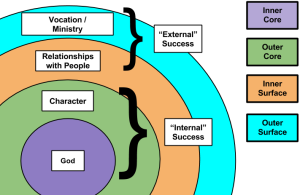JR Smith was one of the unlikely heroes of Game 7 for the Cleveland Cavaliers, and has experienced more than an average share of trouble and controversy in his life. JR Smith had been a mediocre player before coming to the Cavs where he has turned things around, especially in the 2016 playoffs. He averaged 11.5 points per game in the postseason this year, and shot 43% from deep. He had 8 points in the 3rd period of Game 7 of the Finals, keeping the Warriors from being able to build a sizable lead when the rest of the Cavs were cold. lead. He also had to guard Curry and Thompson most of the series and did a good job keeping them in check.
During his post-game 7 interview, he gave most of the credit for his success to his parents and his family. while answering, he mentioned his father, Earl Smith, and that Sunday, was Father’s Day. He then began to cry. Here is a partial transcript of what JR Smith had to say in that interview:
I mean, my parents, my family — that’s the biggest inspiration in my life. I’ve been in a lot of dark spots in my life, and if it wasn’t for them, I wouldn’t be able to get out of them. But they are who they are. They followed me. They yelled at me, they screamed at me. They loved me. They hugged me. They cried with me. They always stuck by my side, no matter right or wrong. And I know a lot of people don’t have their parents in their life — their mother or their father — but, I got the best two. You guys were, I swear. There’s six of us and they didn’t treat any of us different. They loved us the same. They treated us all the same, and I just want to be like them when I grow up. My dad is easily my biggest inspiration to play this game. To hear people talk bad about me, it hurts me, because I know it hurts him, and that’s not who I am. And I know he raised better, and I know I want to do better. Everything I do is for my parents and my family. The cars is nice, the houses is nice, but none of this matters without them. If it wasn’t for them, I wouldn’t be here. I don’t know where I would be. Honestly, if it wasn’t for them — if it wasn’t for the structure and the backbone that I have — I wouldn’t be able to mess up and keep coming back and being able to sit in front of you as a world champion.
That’s pretty cool. I love what he says there an how he says it. I had a couple take-a-ways.
1) Great support comes as a dynamic balance in a tension between compassionate-love and tough-love. If you notice in his transcript he says, “They followed me. They yelled at me, they screamed at me. They loved me. They hugged me. They cried with me.” In a few moments, JR Smith describes that critical balance that is real life. Sometimes you need a hug, sometimes you need a challenge, discipline, and accountability. Real love and real mentoring are able to keep those two end of the tension in harmony.
2) Some people, like JR Smith, are fortunate enough to have loving, caring, genetically-related family members to mentor them and help them through life. That is a true blessing. It is a true blessing to be that kind of family as well. Others have no genetically-related family, or the ones that they do have are abusive, dysfunctional and need to be kept at safe difference. We all need to find people in our lives who will be those positive influences, whether they are genetically-related family or not. On the flip-side, we all need to establish healthy boundaries to keep the negative influences out – genetically-related family, or not.
Finding mentors who believe in us is one of the most important things any of us will ever do. It can mean the difference between being all you were born to be, or falling short and letting opportunities slip away. That leads me to my final take-a-way number
3) If we expect people to be a positive influence in our lives, we should also give of our time, energy and resources to invest in and believe in others. Just like the old saying goes, In order to have a friend you need to be a friend. I have found that expression to be true for mentoring as well. In order to have mentors in your life, you need to be willing to be a mentor in the lives of others.



















